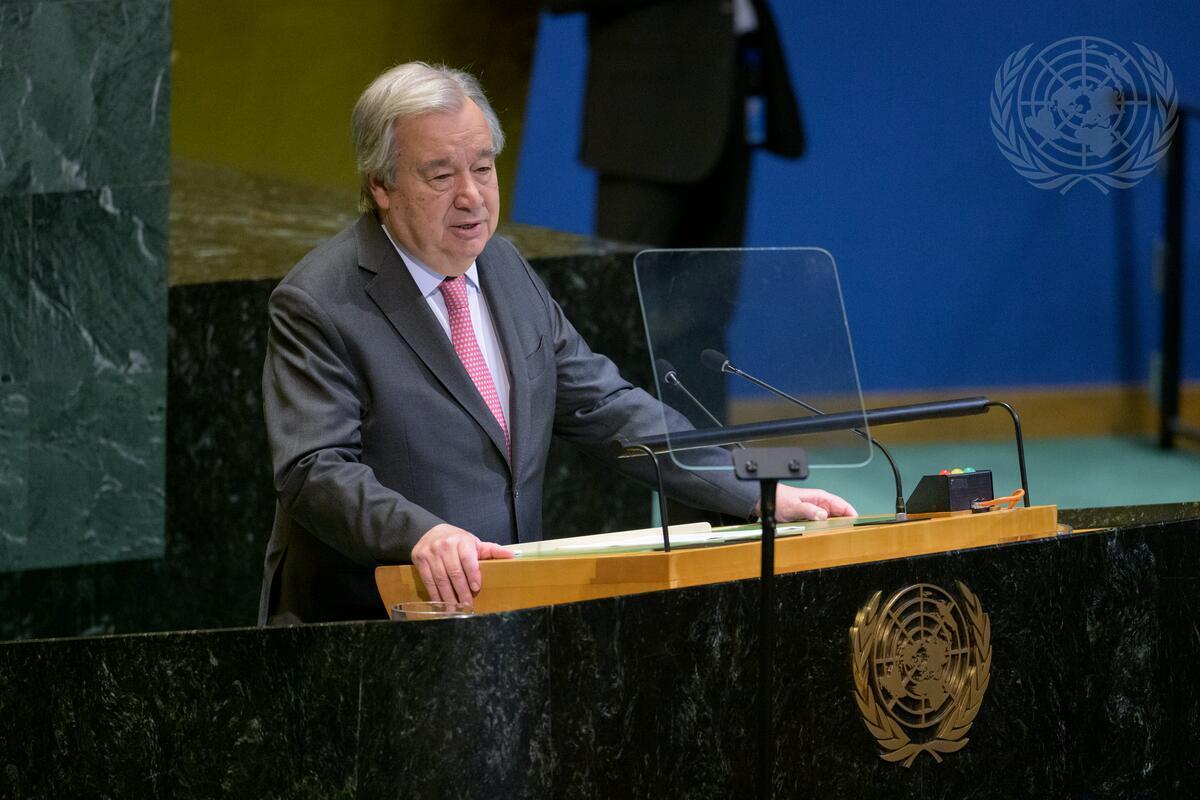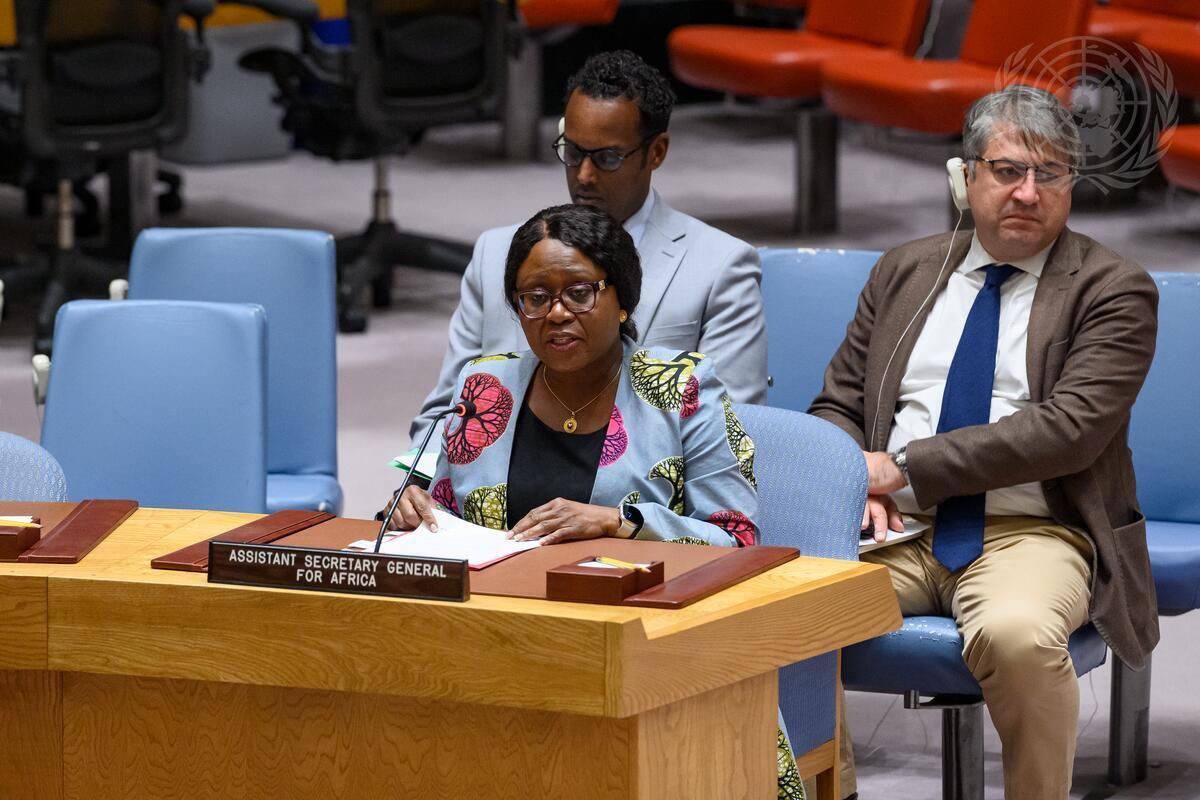Mister President, Members of the Security Council,
Thank you for the opportunity to brief you once more on the situation in Sudan. Almost five months have passed since the deadly conflict erupted between the Sudanese Armed Forces (SAF) and the Rapid Support Forces (RSF). The fighting shows no sign of abating while neither side appears close to a decisive military victory.
Fierce fighting continues in the capital, with the main battles around strategic installations and recurrent attempts by the SAF (the Sudanese Armed Forces) to drive the RSF (the Rapid Support Forces) out of civilian neighbourhoods. At least 5,000 people have been killed since the start of the conflict, and over 12,000 injured. And these are conservative figures, and the actual number is likely much higher. In Darfur, violence has worsened dramatically, and the warring parties have demonstrated blatant disregard for human rights and international humanitarian law. Civilians have been targeted on an ethnic basis and driven out of El Geneina and other locations in Darfur.
Cross-border mobilization of Arab tribes is further fuelling the conflict and impacting regional stability. In South Kordofan and the Blue Nile, fighting between the SAF and the SPLM – North Al Hilu (Sudan People’s Liberation Movement-North / Al Hilu) has left many people displaced and caused civilian casualties.
While the situation is relatively calm in the East, tensions have risen amidst ongoing tribal mobilization. And the mobilization by former regime elements advocating for a continuation of the war is of particular concern. All these developments add to the risk of a fragmentation of the country. What started as a conflict between two military formations could be morphing into a full-scale civil war.
Mister President,
As the war is entering its sixth month, let me take a step back and reflect. The descent into fighting on 15 April could have been avoided if the warring parties had heeded multiple calls of both Sudanese and international actors for de-escalation, and continued with dialogue. Sudanese civilians as well as UNITAMS, with our regional and international partners, all made efforts to help the parties resolve their differences through negotiations. The Framework Agreement of December 2022, which had been negotiated by the military leadership and civilian actors without any external presence, outlined contours of a political agreement to lead the country toward civilian rule. It also stipulated further consultations on contentious subjects, such as transitional justice and security sector reform. And following the request by the military and civilian (partners) signatories, the Trilateral Mechanism – composed of the African Union, IGAD and UNITAMS the United Nations mission – facilitated these consultations in a series of workshops with broad participation from across Sudanese society.
As the consultations proceeded, however, the SAF and the RSF were irresponsibly building up their forces in the capital, while assuring the international community and the Sudanese of their commitment to peace. Until the last moment, I and our Trilateral Mechanism partners had warned that it would only take a spark to ignite armed confrontation. And that is sadly what happened.
Let me be clear, for the benefit of history, that regardless of who fired the first shot, both sides were clearly setting the stage for war. The warring parties chose to settle their conflict through fighting, and it is their duty to the Sudanese people to end it.
Excellencies, Members of the Council,
The leadership of the SAF (of the Sudanese Armed forces) as well as the Ministry of Foreign Affairs insist that this conflict is a struggle between the government on one hand and a rebel force on the other. We, as well as other international and regional actors, continue to speak of the two parties to the conflict, or the two warring parties, that need to end the war. Notably, these two parties constituted what used to be called the military component of the civilian-military partnership under the Constitutional Document of 2019. This partnership was ended by the coup of October 2021 jointly undertaken by the SAF and the RSF. The onus is on the leaderships, the leaderships, of these two formations to stop the fighting. Both sides’ military leaders are needed, are needed to negotiate and implement a cessation of hostilities. But, military leaders should not continue to rule the country.
International partners, including the UN, the African Union, IGAD, the European Union, neighbouring states, Saudi Arabia and the United States, all of us have continued to press the parties to halt the fighting. UNITAMS has remained in close contact with both sides to urge them to commit to a ceasefire in earnest and move toward a permanent cessation of hostilities. While the Jeddah talks (co-facilitated by the United States and the Kingdom of Saudi Arabia) have been formally adjourned, the Jeddah format, which has been accepted by both parties, remains an important avenue for the parties to reach a ceasefire. However, prior ceasefires have only been partially honoured and they have often been used for repositioning and resupply but a durable cessation of hostilities requires a political will, a robust monitoring mechanism and the ability to hold the parties responsible for non-compliance.
I am encouraged that the African Union and IGAD have harmonized their respective roadmaps and efforts to facilitate a political solution. I also commend the Sudan’s Neighbouring States Summit and the resultant ministerial mechanism. Coherence of regional and international efforts is still needed, though.
International and regional actors also need to coordinate the ways and means of influencing the parties to accept a sustainable cessation of hostilities. Most importantly in this context, I urge member states to stem the flow of weapons into Sudan and to refrain from resupplying either side.
Let me in this context commend the Armed Struggle Movements, both those signatories to the Juba Peace Agreement and non-signatories who decided to stay neutral and use their forces for the protection of civilians in Darfur. And let me express my appreciation for all those civilians and civilian initiatives who did not take sides, who are advocating for ending the war, and are working for peace locally.
Members of the Council,
Each side is still waiting for the other side to be weakened into surrender. This is futile. The war is destroying the lives of the Sudanese men and women, violating their basic rights and depriving them of the future they deserve. My OCHA colleague will brief on humanitarian developments, so I am not going into details here.
But let me say that this conflict is leaving a tragic legacy of human rights abuses. Indiscriminate attacks against civilians committed by the warring parties constitute gross violations of human rights. The Massalit community in particular has been living in a pervasive fear of being attacked due to their ethnicity following the heinous murder of West Darfur governor and of other Massalit leaders mid-June. Hundreds at least, have been killed in El Geneina and other parts of West Darfur.
The United Nations Joint Human Rights Office received credible reports about the existence of at least 13 mass graves in El Geneina, at least 13 mass graves in El Geneina, and its surrounding areas as a result of the RSF and Arab militias’ attacks on civilians, with the majority of these civilians from the Massalit community. UNITAMS and UN colleagues are documenting these violations and recall that these acts, if verified, may constitute war crimes.
I remain appalled by the widespread acts of sexual violence and other forms of violence against women. We need credible investigations, accountability for these crimes, as well as services provided for survivors. Sudanese women’s groups are rightly calling for our collective condemnation, as well as for prevention and justice.
Mister President,
Despite the lack of protection of civilians on the ground, Sudanese women and community-based support groups, such as the Emergency Rooms and Resistance Committees, continue to put their lives on the line to provide urgent humanitarian assistance.
Civilian activists, including women, are making laudable efforts leading several anti-war initiatives. They are choosing peace. These initiatives urge the parties to cease violence, to address urgent humanitarian needs and relaunch a political dialogue.
And despite a host of logistical difficulties and security risks, they are intensifying their efforts to coalesce around a common platform.
The plurality of these civilian initiatives reflects the diversity of the Sudanese society. They need our collective support and our encouragement to establish a common platform.
Women-led initiatives in particular have underlined the importance of women’s participation in ceasefire negotiations and any future political process.
Excellencies,
The United Nations will never stay neutral when it comes to war and human rights abuses. We are on the side of the Sudanese civilians, women and children and the vulnerable populations who bear the brunt of the conflict. There is little doubt (about) who is responsible for what: Often indiscriminate aerial bombing is conducted by those who have an air force, which is the SAF. Most of the sexual violence, lootings and killings happen in areas controlled by the RSF and are conducted or tolerated by the RSF and their allies. Both sides are arbitrarily arresting, detaining, and even torturing civilians and there are reports about extrajudicial killings and detention. We need to impress on the warring parties that they cannot operate with impunity, and there will be accountability for the crimes committed.
UNITAMS continues to maintain contact with all sides, including through the Permanent Ceasefire Committee for Darfur, and is supporting Sudanese, regional and international efforts to re-establish peace, because Sudan cannot and must not endure the costs of this war indefinitely.
Mister President, members of the Council,
Let me end on a personal note: I have had the privilege to serve as the United Nations Secretary-General’s Special Representative for Sudan for more than two and a half years. I am grateful to the Secretary-General for that opportunity and for his confidence in me, but I have asked him to relieve me of this duty. This will therefore be my last briefing in this function.
I have come to know Sudan as a country of tremendous potential, indomitable spirit, cultural richness and diversity. The Sudanese people inspired the whole world when they bravely upended three decades of dictatorial rule in 2019. They need our support and solidarity more than ever, they need our support and solidarity in pressuring the military leaderships to end this war and holding them to account, and in empowering civilians for an eventual transition towards democratic governance.
I would like to thank the UN staff in Sudan for their unwavering commitment and dedication in supporting the Sudanese people, and I would like to thank you, members of the Security Council, for your engagement and support to our work.






